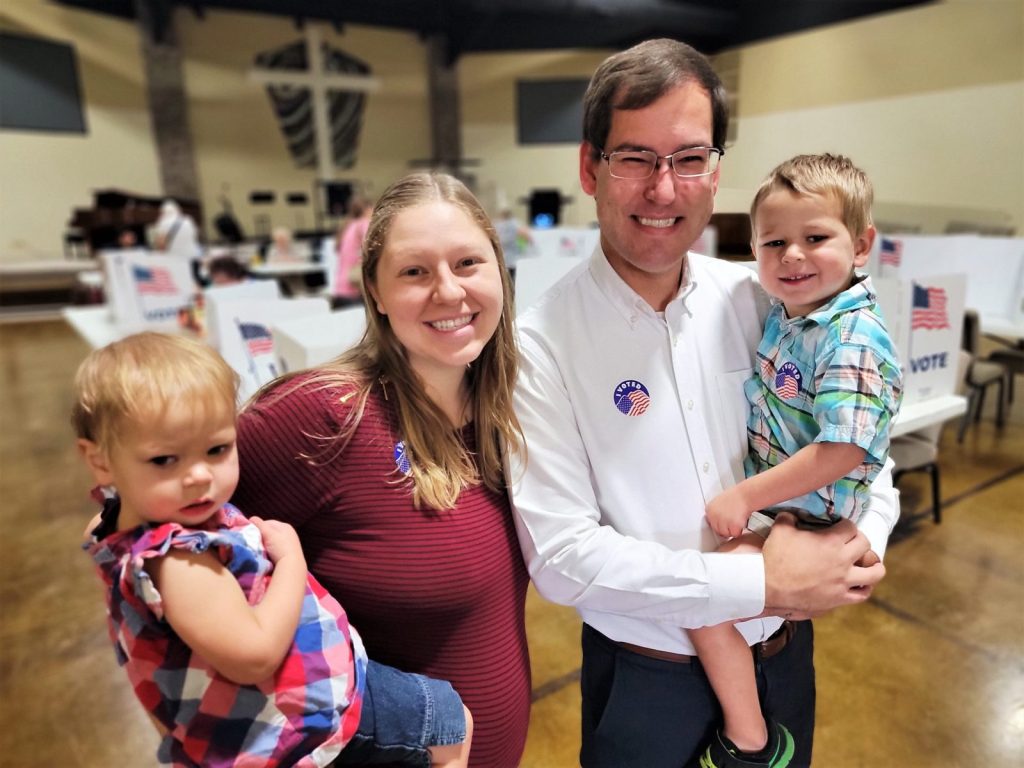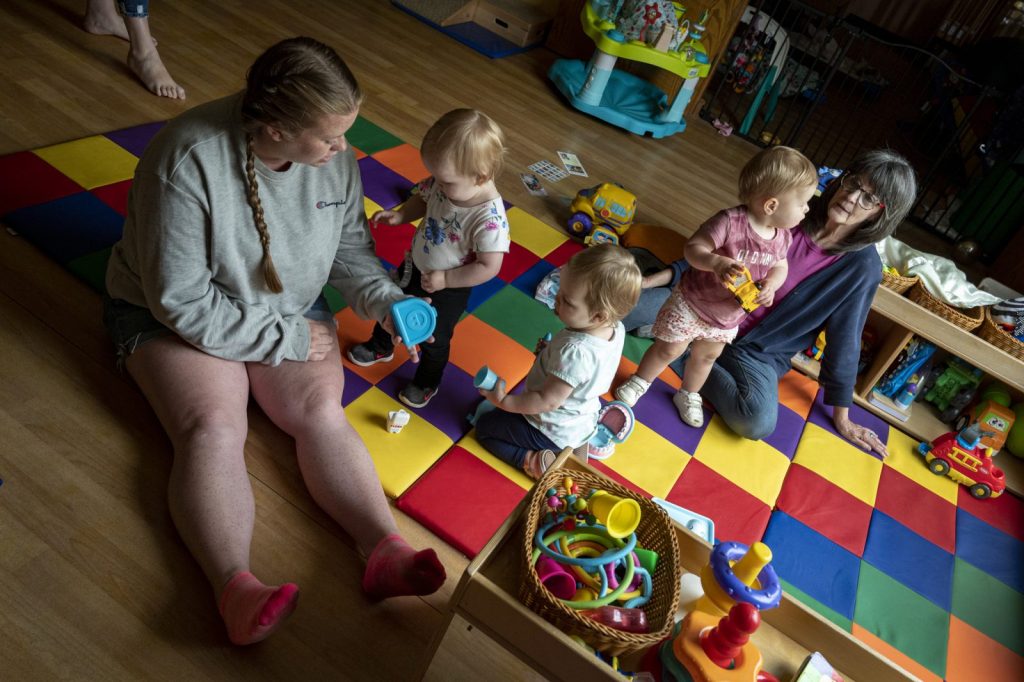First-term incumbent Republican Rep. Alex Riley is seeking reelection, and Battlefield Alderwoman Samantha Deaton is taking her shot in Springfield’s arguably most Republican district.
The redistricting earlier this year significantly altered the borders of House District 134. Whether it will significantly impact the results of an election in what was already a GOP-held district — and estimates show it will grow even more Republican — is yet to be seen.
Many of the constituents of Battlefield, southeastern Springfield and southern Greene County may have never seen Riley’s name on the ballot before but will have the opportunity to either send him back to the House or join the rest of Springfield in electing part of what could be a wave of Democratic women to Jefferson City.
A representative, a lawyer, a dad
Riley, a Springfield native, studied law and political science at Southern Illinois University and Thomas Edison University and has been practicing law in Springfield since he graduated in 2016.

Riley resides in Springfield with his wife and two children, and is an attorney for the law firm McAfee and Taft, in addition to his duties as representative. As a lawyer, Riley primarily focuses on defending businesses when they are sued over wrongful death and personal injury. He has worked with medical providers, hospitals and auto manufacturers including Ford and General Motors.
“One of the reasons I ran in the first place was because I’ve been so frustrated when you’ve got people who just want to start a business, trying to take care of their family and live the American dream, and they have to come to an attorney like me, pay attorney fees, just to make sure they’re in compliance with all the government red tape,” Riley said. “That struck me as really frustrating that people have to do that just to navigate this bureaucratic system that we’ve put in place.”
Deaton looks to take the next step in a political career she’s aspired to since a young age
Deaton also grew up in the Springfield area, although she was born in Iowa, and also traveled out of state for college. She studied psychology and political science at Pittsburg State University.
After school, she returned to Battlefield, where she now resides with her fiancé and child. She currently serves on the Board of Aldermen for the City of Battlefield, has opened the bakery Caked n’ Baked and worked in the child care industry.

She has aspired to become a legislator for much of her life, from when she first walked on the Capitol steps at 11 years old, to when she attended the first inauguration of President Barack Obama to being selected for the Junior National Youth Leadership Conference in 6th grade.
“Citizens are deeply mistrustful of government institutions right now,” Deaton said. “This is a Republican stronghold district and most of the Republican candidates don’t knock doors; they don’t make direct phone calls to voters. So a lot of people just generally have a feeling of being unheard by their government, and I think that’s a really important relationship to repair for people.”
The candidates on matters of local importance
Child care
As both parents of young children, Deaton and Riley, while they may not experience it themselves, can certainly understand the burden the child care shortage is having on the community.

Riley said that he is currently working with child care and business advocacy groups to look into possible solutions, including exploring amending state regulations that could potentially allow for more innovative child care models.
Deaton thinks that a blend of expanding child care subsidies, pre-K programs and investing in day cares, both public and private, could be a step in the right direction. But she also pointed to employment conditions as a factor creating an untenable situation for workers, including how underpaid those employed in the industry are. Employers, who are often small businesses, don’t have to comply with the Family and Medical Leave Act (FMLA) or provide health insurance, she said, which can be unsustainable for many workers.
As someone who has worked in the industry herself, Deaton feels that her experience offers insight into the problem and the potential solutions.
“You just have to make it a priority in the budget,” Deaton said. “The amount of people that are actually covered under those programs is enormously small compared to the amount of people that really struggle with affording child care.”
Homelessness
In recent months, the state legislature passed House Bill 1606, which effectively criminalizes sleeping on state-owned land without consent. To some, it is seen as criminalizing homelessness altogether.
The legislation was based on a model bill written by Austin-based think tank The Cicero Institute, and has been taken up on the floor of multiple other state legislatures. Riley acknowledged that, at first glance, the legislation appears harsh, but is actually an effective tool in encouraging those experiencing homelessness to seek out and use the services available to them.

“What happened in Texas was not that a massive number of homeless individuals were arrested, but instead, they chose to take advantage of services being offered by nonprofits or governmental entities,” Riley said. “While that bill could provide some help by encouraging homeless individuals to seek alternative options, it certainly is not perfect and will not cure the issue.”
As a representative on the Budget Committee, Riley said he had helped “fantastic” nonprofits in Springfield that help the homeless community, and intends to continue doing so if he is reelected.
Deaton described the law as “cruel.” She said the worst part of the legislation was the ability it gave the state to withhold funding from municipalities if they are unable to comply or enforce what it requires, and that it effectively dictate cities’ control over how to address homelessness at a local level. She asserted that investing in affordable housing is the most common sense and effective approach to the issue.
Abortion
When it comes to the issue of abortion, Deaton and Riley have diverging opinions on a matter that could determine the results of many upcoming elections. In light of the recent overturning of Roe v. Wade and the trigger ban implemented in Missouri that effectively bans most abortions, without exceptions for rape or incest, the issue is of high importance to many voters.

“As a dad to a 3-year-old boy, 1-year-old girl, and another little boy who will be born right before election day, I am pro-life and support the current laws which are designed to ensure our most vulnerable have the right to exist,” Riley said.
In relation to potential consequences Missouri’s trigger ban could bring, Riley wants to focus on providing new moms and their babies the support they need, designing a more streamlined adoption process and supplying necessary resources for the state’s foster care system.
Deaton is in complete opposition to the current state restrictions, but would like to see clarification in the language of the “poorly written” current law, which has posed questions about how it applies to various forms of contraceptives, the “morning-after” pill and ectopic pregnancies.
“I think abortion is a medical ethics issue that the government ought not to get involved in,” Deaton said. “It’s an overreach into personal health care decisions between people and their doctors. I’m very open about my experiences with miscarriage, with childbirth, with pregnancy, and all of those topics are very personal. They’re very, very complicated.”
Campaign finance: Big money contributors vs. voter donations
Riley has a significant edge over Deaton when it comes to campaign finances, as he is currently operating his campaign with funds just north of $67,000, compared to the Democrat’s $3,610 budget. (Editor’s note: Daily Citizen Board Chairman Thomas Carlson and his wife Chandler made a donation to Deaton’s campaign. Board members play no role in news coverage decisions.)
Deaton’s primary contributors are individuals, while Riley has received substantial support from political action committees, in addition to individuals. Deaton understands that she faces long odds compared to that of her Democratic counterparts in the area, but is nonetheless bullish about her chances.
“The recent vote in Kansas gives me a lot of hope,” Deaton said, referencing the recent referendum held that overwhelmingly asserted the right to an abortion in the state’s constitution, despite being a reliably Republican state. “We have an awesome team, honestly. All of the Democrats in Greene County running for the House this year are women, and we all work very closely together…I am having a really fantastic time.”
Despite liking his chances, Riley is still putting up signs, still knocking doors, and still campaigning, not making any presumptions about what Nov. 8 has in store for him.
“I’m certainly not taking anything for granted,” he said. “We’re certainly running a robust campaign to make sure that nothing surprising happens on election day. But I think as long as we continue to do the work and run a good campaign, we should be in pretty good shape come election day.”
Where and when to vote, and what you need to bring (click to expand story)
When and where: The general election will take place on Nov. 8. Polls open at 6 a.m. and close at 7 p.m. You can identify your polling location here. Information on absentee voting in Greene County can be found here.
Finding your district: Information about what state House and Senate district you might live in can be found here.
What you need: This is the first election that Missouri’s new photo ID law will be in effect. The Secretary of State’s website provides information about what forms of ID will be acceptable.

